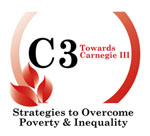In September 2012, over 500 people gathered at the University of Cape Town for a five-day conference entitled, “Towards Carnegie3: Strategies to Overcome Poverty & Inequality”. The conference launched the Carnegie3 Inquiry, at the request of the National Planning Commission, bringing together academics, government officials and members of civil society organisations to share ideas and models for effective action in keeping with the goals spelt out in the National Development Plan, notably the elimination of poverty and the significant reduction of the current levels of inequality. The conference provided a platform for discussion and debate amongst academic researchers, government and practitioners, with a strong focus on effective, practical strategies to address inequality and poverty and inspire change at a local, regional and national level.
Rough Guide
A ‘Rough Guide’ draft report providing an overview of some key themes addressed in over 300 presentations at the September 2012 conference, with particular focus on identifying gaps and areas in need of further research and sharing effective models, is currently being circulated to authors and presenters. The final conference report will be published by the end of 2013.
The conference demonstrated that the country is alive with potential, positively crackling with energy. The issue now for all those who have – or wish to become – involved in the Carnegie3 process is how best to harness this energy in such a way as to reach a critical mass which begins visibly to turn around the unnecessary reality of failing schools, massive unemployment and increasing inequality.
Next Steps
Two next steps may continue to move us along in the right direction. The first is to use this Carnegie3 website to transmit information and share ideas between different organizational, geographical or subject silos. This process will unfold over the coming months. The second is to facilitate small workshops on critical issues in different parts of the country – bringing together government officials, academics and members of civil society to share their knowledge and experience in a process of cross-pollination during three-day workshops on particular themes.
Econ3x3 Forum
Whilst Carnegie3 was stimulated into existence at the request of and with support from the National Planning Commission (NPC) in the Office of the Presidency, the Research Project on Employment, Income Distribution and Inclusive Growth – designed as a national collaborative, independent research initiative – was stimulated and funded by the National Treasury which, in turn, was very supportive of the Carnegie3 process. Through the work of the Research Project lead by Murray Leibbrandt (UCT) and Frederick Fourie (University of the Free State), a number of papers focused specifically on unemployment were submitted to the conference at which the Project was officially launched.
At the same time a dedicated website was established to encourage critical debate (www.econ3x3.org). In its own words, the website publishes accessible research-based contributions and expert commentaries with a view to encouraging debate on an integrated and consistent policy response to unemployment, inequality and poverty and a stronger engagement between research and policy making. From the perspective of the Carnegie3 process, the Econ3x3 Forum is building a powerful network of South African (and other) social scientists promoting dialogue across disciplines and paradigms to deepen our understanding of the dynamics of employment and unemployment, incomes and social outcomes and, notably, the interconnections between these three areas.
